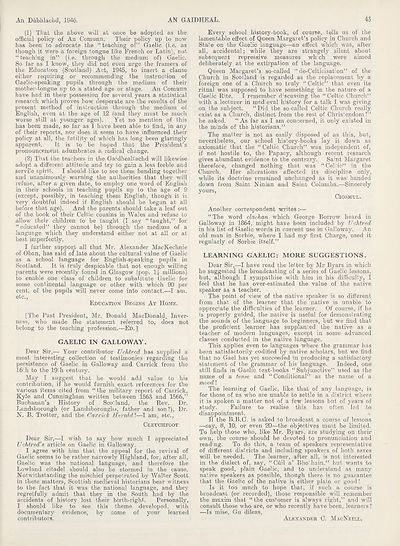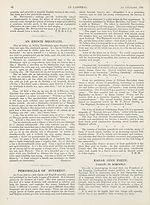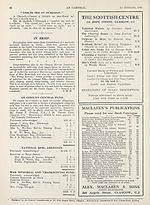An Comunn Gàidhealach Publications > Gaidheal > Volume 42, October 1946--September 1947
(51) Page 43
Download files
Complete book:
Individual page:
Thumbnail gallery: Grid view | List view

AN GAIDHEAL.
43
An Dubhlachd, 1946.
(1) That the above will at once be adopted as the
official policy of An Comunn. Their policy up to now
has been to advocate the “teaching of” Gaelic (i.e. as
though it were a foreign tongue like French or Latin), not
“ teaching in” (i.e. through the medium of) Gaelic.
So far as I know, they did not even urge the framers of
the Education (Scotland) Act, 1945, to insert a clause
either requiring or recommending the instruction of
Gaelic-speaking pupils through the medium of their
mother-tongue up to a stated age or stage. An Comunn
have had in their possession for several years a statistical
research which proves how desperate are the results of the
present method of instruction through the medium of
English, even at the age of 12 (and they must be much
worse still at younger ages). Yet no mention of this
has been made, so far as I have been able to find, in any
of their reports, nor does it seem to have influenced their
policy at all, the futility of which has long been glaringly
apparent. It is to be hoped that the President’s
pronouncement adumbrates a radical change.
(2) That the teachers in the Gaidhealtachd will likewise
adopt a different attitude and try to gain a less feeble and
servile spirit. I should like to see them banding together
and unanimously warning the authorities that they will
refuse, after a given date, to employ one word of English
in their schools in teaching pupils up to the age of 9
(except, possibly, in teaching them English, though it is
very doubtful indeed if English should be begun at all
before that age). And the parents should take a leaf out
of the book of their Celtic cousins in Wales and refuse to
allow their children to be taught (I say “taught,” for
“educated” they cannot be) through the medium of a
language which they understand either not at all or at
best imperfectly.
I further support all that Mr. Alexander MacKechnie
of Oban, has said of late about the cultural value of Gaelic
as a school language for English-speaking pupils in
Scotland. It is truly despicable that not enough willing
parents were recently found in Glasgow (pop. I j millions)
to enable one class of children to substitute Gaelic for
some continental language or other with which 90 per
cent, of the pupils will never come into contact.—I am.
etc.,
Education Begins At Home.
[The Past President, Mr. Donald MacDonald, Inver¬
ness, who made the statement referred to, does not
belong to the teaching profession.—Ed.]
GAELIC IN GALLOWAY.
Dear Sir,— Your contributor Uchtrcd has supplied a
most interesting collection of testimonies regarding the
persistence of Gaelic in Galloway and Garrick from the
16-h to the 19-h century.
May I suggest that he would add value to his
contribution, if he would furnish exact references for the
various items cited from “the military report of Garrick,
Kyle and Cunningham written between 1563 and 1566,”
Buchanan’s History of Scotland, the Rev. Dr.
Landsborough (or Landsboroughs, father and son?), Dr.
N. B. Trotter, and the Carrich Herald''.—I am, etc.,
Cleuchfoot
Dear Sir,—I wish to say how much I appreciated
Vchtred's article on Gaelic in Galloway.
I agree with him that the appeal for the revival of
Gaelic seems to be rather narrowly Highland, for, after all,
Gaelic was the national language, and therefore the
Lowland citadel should also be stormed in the cause.
Notwithstanding the mischief perpetrated by Walter Scott
in these matters, Scottish medieval historians bear witness
to the fact that it was the national language, and they
regretfully admit that they in the South had by the
accidents of history lost their birth-right. Personally,
I should like to see this theme developed, with
documentary evidence, by Gome of your learned
contributors.
Every school history-book, of course, tells us of the
lamentable effect of Queen Margaret’s policy in Church and
State on the Gaelic language—an effect which was, after
all, accidental; while they are strangely silent about
subsequent repressive measures wlrch were aimed
deliberately at the extirpation of the language.
Queen Margaret’s so-called “ de-Celticisation” of the
Church in Scotland is regarded as the replacement by a
foreign one of a Church so truly “Celtic” that even its
ritual was supposed to have something in the nature of a
Gaelic Rite. I remember d’scussing the “Celtic Church”
with a lecturer in med eval history for a talk I was giving
on the subject. “ Did the so-called Celtic Church really
exist as a Church, distinct from the rest of Christendom?”
he asked. “As far as I am concerned, it only existed in
the minds of the historians.”
The matter is not as easily disposed of as this, but,
nevertheless, our school history-books lay it down as
axiomatic that the “Celtic Church” was independent of,
if not hostile to, the Papacy, although recent research
gives abundant evidence to the contrary. Sa’nt Margaret
therefore, changed nothing that was “Celtic” in the
Church. Her alterations affected its discipline only,
while its doctrine remained unchanged as it was handed
down from Saint Ninian and Saint Columba.—Sincerely
yours,
Ciosmux.
Another correspondent writes:—
“The word claehan which George Borrow heard in
Galloway in 1864, might have been included by Uchtred
in his list of Gaelic words in current use in Galloway. An
old man in Sorbie, where I had my first Charge, used it
regularly of Sorbie itself.”
LEARNING GAELIC: MORE SUGGESTIONS.
Dear Sir,—I have read the letter by Mr Byars in which
he suggested the broadcasting of a series of Gaelic lessons,
but, although I sympathise with him in his difficulty, I
feel that he has over-estimated the value of the native
speaker as a teacher.
The point of view of the native speaker is so different
from that of the learner that the native is unable to
appreciate the difficulties of the learner. Of course, if he
is properly guided, the native is useful for demonstrating
the sounds of the language to beginners, but we find that
the proficient learner has supplanted the native as a
teacher of modern languages, except in some advanced
classes conducted in the native language.
This applies even to languages where the grammar has
been satisfactorily codified by native scholars, but we find
that no Gael has yet succeeded in producing a satisfactory
statement of the grammar of his language. Indeed, one
still finds in Gaelic text-books “Subjunctive” used as the
name of a tense and “Conditional” as the name of a
mood!
The learning of Gaelic, like that of any language, is
for those of us who are unable to settle in a district where
it is spoken a matter not of a few lessons but of years of
study. Failure to realise this has often led to
disappointment.
If the B.B.C. is asked to broadcast a course of lessons
—say, 8, 10, or even 20—the objectives must be limited.
To help those who, like Mr. Byars, are studying on their
own, the course should be devoted to pronunciation and
reading. To do this, a team of speakers representative
of different districts and including speakers of both sexes
will be needed. The learner, after all, is not interested
in the dialect of, say, “ Cuil a’ Bho'hain,” but wants to
speak good, plain Gaelic, and to understand as many
native speakers as possible, though there is no guarantee
that the Gaelic of the native is either plain or good!
Is it too much to hope that, if such a course is
broadcast (or recorded), those responsible will remember
the maxim that “the customer is always right,” and will
consult those who are, or who recently have been, learners ?
—Is mise, Gu dileas,
Alexander C. MacNeill,
43
An Dubhlachd, 1946.
(1) That the above will at once be adopted as the
official policy of An Comunn. Their policy up to now
has been to advocate the “teaching of” Gaelic (i.e. as
though it were a foreign tongue like French or Latin), not
“ teaching in” (i.e. through the medium of) Gaelic.
So far as I know, they did not even urge the framers of
the Education (Scotland) Act, 1945, to insert a clause
either requiring or recommending the instruction of
Gaelic-speaking pupils through the medium of their
mother-tongue up to a stated age or stage. An Comunn
have had in their possession for several years a statistical
research which proves how desperate are the results of the
present method of instruction through the medium of
English, even at the age of 12 (and they must be much
worse still at younger ages). Yet no mention of this
has been made, so far as I have been able to find, in any
of their reports, nor does it seem to have influenced their
policy at all, the futility of which has long been glaringly
apparent. It is to be hoped that the President’s
pronouncement adumbrates a radical change.
(2) That the teachers in the Gaidhealtachd will likewise
adopt a different attitude and try to gain a less feeble and
servile spirit. I should like to see them banding together
and unanimously warning the authorities that they will
refuse, after a given date, to employ one word of English
in their schools in teaching pupils up to the age of 9
(except, possibly, in teaching them English, though it is
very doubtful indeed if English should be begun at all
before that age). And the parents should take a leaf out
of the book of their Celtic cousins in Wales and refuse to
allow their children to be taught (I say “taught,” for
“educated” they cannot be) through the medium of a
language which they understand either not at all or at
best imperfectly.
I further support all that Mr. Alexander MacKechnie
of Oban, has said of late about the cultural value of Gaelic
as a school language for English-speaking pupils in
Scotland. It is truly despicable that not enough willing
parents were recently found in Glasgow (pop. I j millions)
to enable one class of children to substitute Gaelic for
some continental language or other with which 90 per
cent, of the pupils will never come into contact.—I am.
etc.,
Education Begins At Home.
[The Past President, Mr. Donald MacDonald, Inver¬
ness, who made the statement referred to, does not
belong to the teaching profession.—Ed.]
GAELIC IN GALLOWAY.
Dear Sir,— Your contributor Uchtrcd has supplied a
most interesting collection of testimonies regarding the
persistence of Gaelic in Galloway and Garrick from the
16-h to the 19-h century.
May I suggest that he would add value to his
contribution, if he would furnish exact references for the
various items cited from “the military report of Garrick,
Kyle and Cunningham written between 1563 and 1566,”
Buchanan’s History of Scotland, the Rev. Dr.
Landsborough (or Landsboroughs, father and son?), Dr.
N. B. Trotter, and the Carrich Herald''.—I am, etc.,
Cleuchfoot
Dear Sir,—I wish to say how much I appreciated
Vchtred's article on Gaelic in Galloway.
I agree with him that the appeal for the revival of
Gaelic seems to be rather narrowly Highland, for, after all,
Gaelic was the national language, and therefore the
Lowland citadel should also be stormed in the cause.
Notwithstanding the mischief perpetrated by Walter Scott
in these matters, Scottish medieval historians bear witness
to the fact that it was the national language, and they
regretfully admit that they in the South had by the
accidents of history lost their birth-right. Personally,
I should like to see this theme developed, with
documentary evidence, by Gome of your learned
contributors.
Every school history-book, of course, tells us of the
lamentable effect of Queen Margaret’s policy in Church and
State on the Gaelic language—an effect which was, after
all, accidental; while they are strangely silent about
subsequent repressive measures wlrch were aimed
deliberately at the extirpation of the language.
Queen Margaret’s so-called “ de-Celticisation” of the
Church in Scotland is regarded as the replacement by a
foreign one of a Church so truly “Celtic” that even its
ritual was supposed to have something in the nature of a
Gaelic Rite. I remember d’scussing the “Celtic Church”
with a lecturer in med eval history for a talk I was giving
on the subject. “ Did the so-called Celtic Church really
exist as a Church, distinct from the rest of Christendom?”
he asked. “As far as I am concerned, it only existed in
the minds of the historians.”
The matter is not as easily disposed of as this, but,
nevertheless, our school history-books lay it down as
axiomatic that the “Celtic Church” was independent of,
if not hostile to, the Papacy, although recent research
gives abundant evidence to the contrary. Sa’nt Margaret
therefore, changed nothing that was “Celtic” in the
Church. Her alterations affected its discipline only,
while its doctrine remained unchanged as it was handed
down from Saint Ninian and Saint Columba.—Sincerely
yours,
Ciosmux.
Another correspondent writes:—
“The word claehan which George Borrow heard in
Galloway in 1864, might have been included by Uchtred
in his list of Gaelic words in current use in Galloway. An
old man in Sorbie, where I had my first Charge, used it
regularly of Sorbie itself.”
LEARNING GAELIC: MORE SUGGESTIONS.
Dear Sir,—I have read the letter by Mr Byars in which
he suggested the broadcasting of a series of Gaelic lessons,
but, although I sympathise with him in his difficulty, I
feel that he has over-estimated the value of the native
speaker as a teacher.
The point of view of the native speaker is so different
from that of the learner that the native is unable to
appreciate the difficulties of the learner. Of course, if he
is properly guided, the native is useful for demonstrating
the sounds of the language to beginners, but we find that
the proficient learner has supplanted the native as a
teacher of modern languages, except in some advanced
classes conducted in the native language.
This applies even to languages where the grammar has
been satisfactorily codified by native scholars, but we find
that no Gael has yet succeeded in producing a satisfactory
statement of the grammar of his language. Indeed, one
still finds in Gaelic text-books “Subjunctive” used as the
name of a tense and “Conditional” as the name of a
mood!
The learning of Gaelic, like that of any language, is
for those of us who are unable to settle in a district where
it is spoken a matter not of a few lessons but of years of
study. Failure to realise this has often led to
disappointment.
If the B.B.C. is asked to broadcast a course of lessons
—say, 8, 10, or even 20—the objectives must be limited.
To help those who, like Mr. Byars, are studying on their
own, the course should be devoted to pronunciation and
reading. To do this, a team of speakers representative
of different districts and including speakers of both sexes
will be needed. The learner, after all, is not interested
in the dialect of, say, “ Cuil a’ Bho'hain,” but wants to
speak good, plain Gaelic, and to understand as many
native speakers as possible, though there is no guarantee
that the Gaelic of the native is either plain or good!
Is it too much to hope that, if such a course is
broadcast (or recorded), those responsible will remember
the maxim that “the customer is always right,” and will
consult those who are, or who recently have been, learners ?
—Is mise, Gu dileas,
Alexander C. MacNeill,
Set display mode to:
![]() Universal Viewer |
Universal Viewer | ![]() Mirador |
Large image | Transcription
Mirador |
Large image | Transcription
| An Comunn Gàidhealach > An Comunn Gàidhealach Publications > Gaidheal > Volume 42, October 1946--September 1947 > (51) Page 43 |
|---|
| Permanent URL | https://digital.nls.uk/125249916 |
|---|
| Description | This contains items published by An Comunn, which are not specifically Mòd-related. It includes journals, annual reports and corporate documents, policy statements, educational resources and published plays and literature. It is arranged alphabetically by title. |
|---|
| Description | A collection of over 400 items published by An Comunn Gàidhealach, the organisation which promotes Gaelic language and culture and organises the Royal National Mòd. Dating from 1891 up to the present day, the collection includes journals and newspapers, annual reports, educational materials, national Mòd programmes, published Mòd literature and music. |
|---|---|
| Additional NLS resources: |
|

